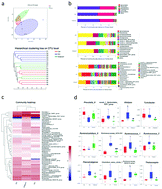当前位置:
X-MOL 学术
›
Food Funct.
›
论文详情
Our official English website, www.x-mol.net, welcomes your feedback! (Note: you will need to create a separate account there.)
Alteration of the gut microbiota by vinegar is associated with amelioration of hyperoxaluria-induced kidney injury
Food & Function ( IF 6.1 ) Pub Date : 2020/03/03 , DOI: 10.1039/c9fo02172h Wei Zhu 1, 2, 3, 4 , Yang Liu 1, 2, 3, 4 , Xiaolu Duan 1, 2, 3, 4 , Chenglin Xiao 3, 4, 5, 6 , Yu Lan 1, 2, 3, 4 , Lianmin Luo 1, 2, 3, 4 , Chengjie Wu 1, 2, 3, 4 , Zhou Yang 1, 2, 3, 4 , Xin Mai 1, 2, 3, 4 , Suilin Lu 1, 2, 3, 4 , Wen Zhong 1, 2, 3, 4 , Shujue Li 1, 2, 3, 4 , Zihao He 1, 2, 3, 4 , Xin Zhang 1, 2, 3, 4 , Yongda Liu 1, 2, 3, 4 , Guohua Zeng 1, 2, 3, 4
Food & Function ( IF 6.1 ) Pub Date : 2020/03/03 , DOI: 10.1039/c9fo02172h Wei Zhu 1, 2, 3, 4 , Yang Liu 1, 2, 3, 4 , Xiaolu Duan 1, 2, 3, 4 , Chenglin Xiao 3, 4, 5, 6 , Yu Lan 1, 2, 3, 4 , Lianmin Luo 1, 2, 3, 4 , Chengjie Wu 1, 2, 3, 4 , Zhou Yang 1, 2, 3, 4 , Xin Mai 1, 2, 3, 4 , Suilin Lu 1, 2, 3, 4 , Wen Zhong 1, 2, 3, 4 , Shujue Li 1, 2, 3, 4 , Zihao He 1, 2, 3, 4 , Xin Zhang 1, 2, 3, 4 , Yongda Liu 1, 2, 3, 4 , Guohua Zeng 1, 2, 3, 4
Affiliation

|
Hyperoxaluria is well known to cause renal injury and end-stage kidney disease. Previous studies suggested that the renal function of rats with hyperoxaluria was improved after dietary vinegar intake. However, its underlying mechanisms remain largely unknown. The aim of the present study was to examine changes of gut microbiota and blood and urinary metabolites that associate with changes in kidney function to identify mechanisms involved with vinegar induced amelioration of hyperoxaluria-induced kidney injury. Using an ethylene glycol (EG)-induced hyperoxaluria rat model, we evaluated the effects of the vinegar on renal injury. Oral administration of vinegar (2 ml kg−1 day−1) reduced the elevated serum creatinine, BUN, and protected against hyperoxaluria-induced renal injury, renal fibrosis, and inflammation. Gut microbiota analysis of 16S rRNA gene in the hyperoxaluria-induced renal injury rats showed that vinegar treatment altered their microbial composition, especially the recovery of the levels of the Prevotella, Ruminiclostridium, Alistipes and Paenalcaligenes genus, which were significantly increased in the hyperoxaluria-induced renal injury rats. Additionally, liquid chromatography-mass spectrometry (LC-MS)-based metabolome analysis showed that total of 35 serum and 42 urine metabolites were identified to be associated with protective effects of vinegar on hyperoxaluria-induced renal injury rats. Most of these metabolites were involved in thiamine metabolism, glycerol phosphate shuttle, biotin metabolism, phosphatidylcholine biosynthesis and membrane lipid metabolism. Importantly, the effects of vinegar against renal injury were weakened after depletion of gut microbiota by antibiotic treatment. These results suggest that vinegar treatment ameliorates the hyperoxaluria-induced renal injury by improving the gut microbiota and metabolomic profiles.
中文翻译:

食醋对肠道菌群的改变与高草酸尿引起的肾脏损伤的改善有关
众所周知,高草酸尿症会引起肾损伤和终末期肾脏疾病。先前的研究表明,摄入食醋后,高草酸尿大鼠的肾功能得到改善。但是,其基本机制仍然未知。本研究的目的是检查与肾脏功能变化有关的肠道菌群,血液和尿液代谢物的变化,以确定与醋引起的高草酸尿引起的肾脏损伤改善的机制。使用乙二醇(EG)诱导的高草酸尿大鼠模型,我们评估了醋对肾损伤的影响。口服醋(2 ml千克-1天-1)降低了血清肌酐,BUN的升高,并防止高草酸尿症引起的肾损伤,肾纤维化和炎症。在高草酸尿,肾损伤大鼠16S rRNA基因的肠道菌群分析表明,醋疗改变了他们的微生物组成,尤其是水平的恢复普雷沃,Ruminiclostridium,Alistipes和Paenalcaligenes属,在高草酸尿症诱发的肾损伤大鼠中显着增加。此外,基于液相色谱-质谱(LC-MS)的代谢物分析表明,总共鉴定出35种血清和42种尿液代谢物与醋对高草酸尿所致肾损伤大鼠的保护作用有关。这些代谢物大多数涉及硫胺素代谢,甘油磷酸穿梭,生物素代谢,磷脂酰胆碱的生物合成和膜脂质代谢。重要的是,通过抗生素治疗消耗肠道菌群后,醋对肾损伤的作用减弱。这些结果表明,醋处理通过改善肠道菌群和代谢组学特征来改善高草酸尿症引起的肾脏损伤。
更新日期:2020-03-27
中文翻译:

食醋对肠道菌群的改变与高草酸尿引起的肾脏损伤的改善有关
众所周知,高草酸尿症会引起肾损伤和终末期肾脏疾病。先前的研究表明,摄入食醋后,高草酸尿大鼠的肾功能得到改善。但是,其基本机制仍然未知。本研究的目的是检查与肾脏功能变化有关的肠道菌群,血液和尿液代谢物的变化,以确定与醋引起的高草酸尿引起的肾脏损伤改善的机制。使用乙二醇(EG)诱导的高草酸尿大鼠模型,我们评估了醋对肾损伤的影响。口服醋(2 ml千克-1天-1)降低了血清肌酐,BUN的升高,并防止高草酸尿症引起的肾损伤,肾纤维化和炎症。在高草酸尿,肾损伤大鼠16S rRNA基因的肠道菌群分析表明,醋疗改变了他们的微生物组成,尤其是水平的恢复普雷沃,Ruminiclostridium,Alistipes和Paenalcaligenes属,在高草酸尿症诱发的肾损伤大鼠中显着增加。此外,基于液相色谱-质谱(LC-MS)的代谢物分析表明,总共鉴定出35种血清和42种尿液代谢物与醋对高草酸尿所致肾损伤大鼠的保护作用有关。这些代谢物大多数涉及硫胺素代谢,甘油磷酸穿梭,生物素代谢,磷脂酰胆碱的生物合成和膜脂质代谢。重要的是,通过抗生素治疗消耗肠道菌群后,醋对肾损伤的作用减弱。这些结果表明,醋处理通过改善肠道菌群和代谢组学特征来改善高草酸尿症引起的肾脏损伤。


























 京公网安备 11010802027423号
京公网安备 11010802027423号